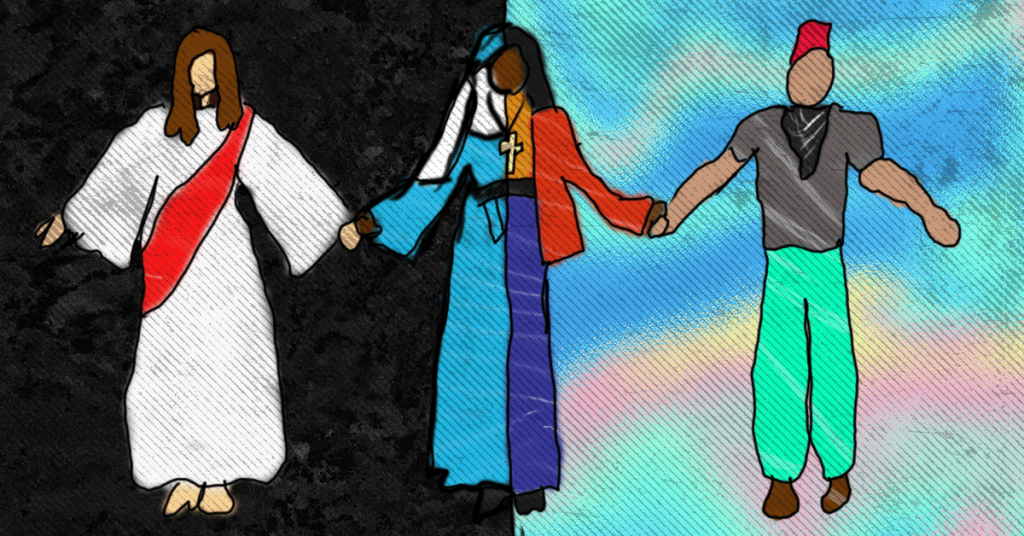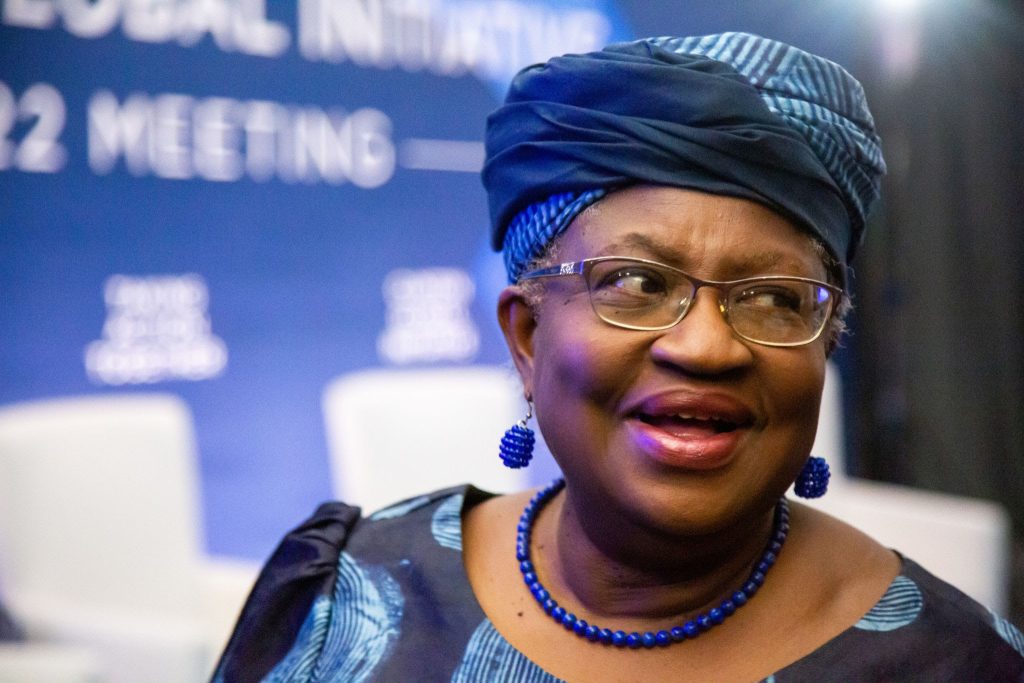Nigeria: From holy celibacy to secret lesbian marriage
‘I realised that I was gay after I had decided to live a life of celibacy at 17’
Awele, a lesbian from Nigerian, tells of her childhood, her journey to self-acceptance and the daily struggle that comes from being unable to share the joys of her secret marriage with her religious parents. An article from Minority Africa, used with permission.

Abuja, Nigeria — When asked, “What kind of childhood did you have?”Awele responds cheerfully.
“I had a very happy childhood. I had a very protected childhood. I had a very soft childhood. I think you might say anything you want to say about my parents, but one thing I will always give them the accolades for is the kind of life they gave my siblings and me, both in terms of the schools we attended and the life they afforded us.
“Saying this does not mean we went for summer holiday every summer, but if any of us told our parents they wanted a rolling school bag, my parents would get it for them. It never mattered what issues they had between them; they always put us first.”
It is easy to imagine the beautiful memories of growing up she still holds on to as she speaks. Awele had what any Nigerian would agree was ‘a normal life.’
Eleven years ago, she was in her second year as an undergraduate studying finance at a university in southeastern Nigeria. Her goals were clear: finish with a good result, move to the United States for a master’s degree, work at the International Monetary Fund (IMF), and become the next Ngozi Okonjo-Iweala, the current Director-General of the World Trade Organisation (WTO), who at the time was popular for graduating summa cum laude from Harvard, working at the World Bank for 25 years before serving as Nigeria’s finance minister. Awele even hoped they could be friends someday.

While Awele has not met or become best friends with Okonjo-Iweala, she has found her way to the United States, has a Master’s from a prestigious university, and works at the IMF as planned.
In fact, things turned out better than she had planned because Awele had not hoped to find love while rounding up her postgrad programme.
In her very sheltered childhood, Awele was only worried about schoolwork, chores, and nothing more. When she ran around the compound playing with her shirt open and billowing in the wind with a sponge stuck in her shorts to serve as a penis, that was just her being.
“I did not think anything of it. I thought everyone was allowed to be who they wanted to be.”
Awele says she did not have any queer icons growing up because she did not need to. “The first time I heard of any queer person was Ellen DeGeneres, and I was well into secondary school then. Nobody around me, aunty, cousin, was ostracised because they were queer. It is also why when people ask, ‘When did you turn gay?’ I laugh because – no. Na follow-come.”

Awele’s upbringing was strictly Catholic, and at 17, in her first year as a university student, she had a deep conviction she had a calling to a life of celibacy. At first, she felt she had experienced religion differently: She understood God and religion from a place of love, not vengeance or suffering. This new view on religion came from the teachings and doctrinal classes she received from a university centre managed by the Opus Dei.
Her parents and siblings introduced her to Opus Dei when she was younger. Opus Dei, a group in the Catholic Church, taught lay people that they could attain sainthood by loving God and offering up the most mundane, ordinary parts of their life and work to Him. It sounded good to Awele: a life where you lived, loved God, worked hard and attained sainthood. It was all her Catholic upbringing could have wished for.
The hunger to serve God and navigate her sexuality as best she could at this point was also largely informed by a fresh wave of flagrant homophobia which swept through Nigeria in the wake of the signing of the Same-Sex Marriage (Prohibition) Act (SSMPA), Nigeria’s anti-gay bill, into law by the then president Goodluck Ebele Jonathan.
She died a little inside with each homophobic remark and each extra year.
Despite having a sheltered childhood, Awele experienced immense depression in her late teenage years. As she became aware of her sexuality and heard what the people around her had to say about people like her, she died a little inside with each homophobic remark and each extra year. She did not want to bring shame to her family. She did not want to disappoint them, so she did everything to keep the gay in her locked away.
“I realised that I was gay after I had decided to live a life of celibacy at 17 because of this new-learnt feeling of God’s love for me. I was afraid of what this could mean for me when I died if I were to act on it. So out of fear of sinning against God, either because of my sexuality or because of sexual kinks, I was beginning to see that I may have, I held even more tightly to what I thought was my vocation,” she says. “I would not even say I left it on the backseat, no. I locked it in the trunk and tied heavy boulders on the trunk to make sure it never showed. I could not afford to disappoint my family in any way.”
Unexpectedly, Awele did not go ahead with her intentions to live a life of celibacy. Even though her parents had introduced her and her siblings to Opus Dei, her mother did not accept her decision. She demanded that Awele become a reverend sister instead, as the celibacy they practised was more traditionally catholic than what was obtainable in the Opus Dei. Among other things, reverend sisters were identifiably different from lay Catholics because they wore a habit. A celibate member of the Opus Dei, on the other hand, wore no differentiating habit, took no vows and was ultimately a lay catholic who had decided they would not get married.
Beyond this, Awele had questions of her own, too. She wanted to know what would happen if she changed her mind and wanted to leave the organisation. “If I was going to promise in a letter to the prelate that I would live a life of celibacy, surrendering my freedom and finances completely to them, I needed to know what would happen if I changed my mind at any point down the line.”
Awele did not get answers to these equations, which did not sit well with her. The director of her centre, with whom she had shared her concerns, dismissed them, simply saying, “You don’t think about divorce when you are getting married.”
In the end, Awele walked away from the Opus Dei.
Emigration, postgrad, and self-discovery
“Before leaving Nigeria, I was already exploring my sexuality, in a manner of speaking,” Awele says. “I did not get sexual in a way with anyone because I still was not bold about who I knew I was. I was afraid. I had a burner account on Twitter because I was too afraid to tweet anything remotely gay.”
Despite knowing she would end up with a woman, the strife she saw in her parents’ relationship while growing up made her not think of getting married. She only knew that if she ever had a long-term partner, it would be a woman. Still, Awele says, in the early days of discovering herself, “I was at that point where if someone had pressured me, I would have gone ahead and married a man just so that peace would reign.”
Some of the things she learnt when she began exploring her sexuality was where one could meet other queer people. “Book clubs, Sip and Paint, or through direct introduction from people you already know were some of the ways I was able to meet people.”
But leaving Nigeria for a master’s in the United States to follow her dream of becoming a leading figure in global finance opened more options to Awele. She deleted her burner account and decided not to live a double life in her new dispensation.
Affording her tuition drained her parents’ savings, and they sold properties and almost went into debt, but they were more than happy to do it. “When I tell you that my parents would move the world for their children, I mean it,” she adds.
In America, Awele looked at herself in the mirror and called herself a lesbian for the first time.
“The year was 2020, I was 25, there was a pandemic, and it dawned on me that I had lived 25 years of my life for my family and none of those years for myself. I looked at myself and called myself what I was by name,” she says. “I told myself I was a lesbian, and that was neither a slur nor a bad thing but just what I was. I knew I had incredible humour and that I was exceptionally talented. I am what you call a multipotentialite, and I am – just like every Nigerian or even African queer person I know – creative beyond imagination. So I had to tell myself, ‘You are a lesbian, the most brilliant lesbian I know, and you have to rock that.’ Admitting that to myself was powerful, and it helped settle me. I moved into this new place with this self-awareness that called me to love myself more.”
Acknowledging her sexuality might have settled Awele, but it did not undo years of homophobic retorts she heard growing up in Enugu, Nigeria, where most people were Catholic and lived conservative lives. It was some time before Awele became accustomed to public displays of affection – even when platonic – from other girls. She was always well aware of how self-conscious such acts left her, and she struggled to pull her psyche out of that discomfort.
When Awele met Ruby (an alias), the woman who would become her wife, things played out differently from her plans and what she was used to. Ru’s family loved her. They loved her for just being, and they loved Awele the same way. There was gentleness in the love Ru’s family showed Ru, and the love Ru showed her family and Awele led to Awele changing her mind about marriage.
“Two years into my relationship with Ru, I knew it would be an utterly wicked thing to do to myself if I did not marry someone who loved me like this,” Awele says.
Navigating queer love against the backdrop of homophobia
Awele believes that neither the SSMPA nor the general homophobia in Nigeria had a direct impact on her growing up. “I know I speak from a place of privilege because, to a very large extent, my life was sheltered, and my immediate family was largely enlightened, but there were still comments about other people, comments about openly gay people or about women who wear leg chains (some Nigerians once believed that only lesbians wore leg chains) and these comments had an impact, they made me see that people thought of gay people in a certain way.”
The homophobia she witnessed from close relatives and friends directed at openly gay people while she was in Nigeria meant that despite leaving Nigeria. Awele had to navigate being in love alone. She understood that the topic of sexuality was not one she could broach to her Catholic parents. There was no right time for her to do so, and her lesbian experience required finding herself, loving herself, falling in love, and being scared to her bone of what it would mean if her parents found out she was lesbian.
“Before I married my wife, I experienced two gut-wrenching breakups that left me heartbroken for some time, and I had to find a way to deal with that by myself. I could not tell anyone in my family what was wrong with me, which is hard because my family is very close-knit; we tell each other everything,” she says. “The one time I summoned the courage to share my pain with one of my sisters, I had to switch the gender of the person who hurt me. That is not a way to live., “I do not want to censor myself in my hurt because when my people come to me for comfort, I do not want them censoring themselves.”
At this point, Awele breaks down in tears. “Even when I wanted to get married, I could not tell anyone. I did not know any gay person who was married. I only told one of my sisters because others would have tried to scatter everything. I had to do it all by myself. I was marrying into a loving family that loved themselves and loved me, and I could not even get my mum or dad to share this special day with me.”
Awele speaks with her parents every other day but has yet to tell any of them that Ru is more than a housemate and a friend to her. She told her sisters about being married to Ru, and one of them stopped speaking to her because she believed Awele was living in sin. “On one hand, it breaks my heart but then also I know that she is wrong, so I let her be,” Awele says with a resigned sigh.
I do not believe the kind of love I have with my wife should stay a secret.
Asked if she has made peace with not telling her parents about her marriage, she responds, “I have never come to terms with not telling them. I could never. I will tell them as soon as possible because I do not believe the kind of love I have with my wife should stay a secret. Moreover, if I can be okay with them being straight and if I can entertain stories of family members who do not have perfect marriages or families, I am sure they will find a way to entertain my superbly lovely marriage.”
For Awele, the worst part about not telling her parents is pretending that the absolute love of her life is only her roommate. There had always been something each time she had to bring it up with her parents. She lets these opportunities pass after her sisters plead with her to hold off until a better time. While she is willing to wait a little longer, Awele has resolved that if any of her relatives ever bring up the question with her by themselves, she would not deny it.
“I am lucky to be married to a wonderful woman who understands that there are cultural, religious and institutional undertones that make African homophobia different and that she does not press me to tell my family about us,” Awele says. “My wanting to tell them is just me. It stems from the fact that I deeply believe that the love I share with Ru should not be hidden. It is too beautiful to be hidden.”




